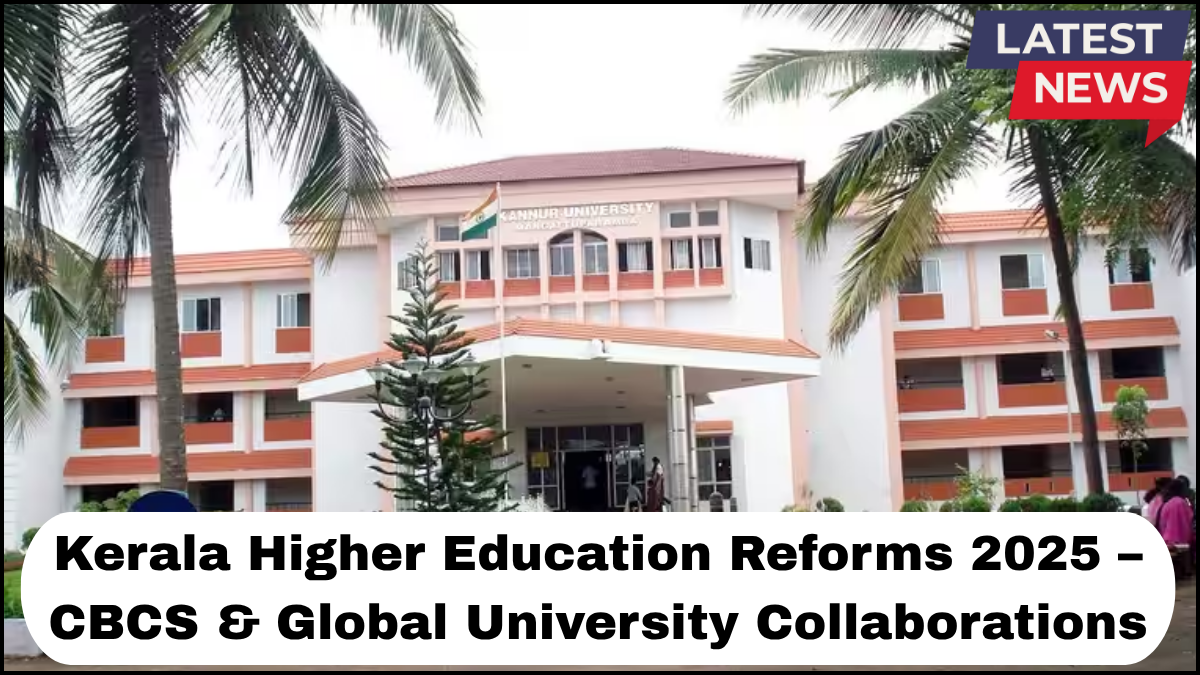Kerala is taking bold steps to transform its academic ecosystem. The Kerala higher education reforms 2025 mark a significant shift toward flexibility, innovation, and international cooperation. At the heart of this transformation lie two major strategies: the CBCS system (Choice Based Credit System) and foreign university tie-ups. These initiatives aim to modernize learning, align curricula with global standards, and boost employability.

Understanding the Core of Kerala Higher Education Reforms 2025
The 2025 reforms are not cosmetic tweaks. They are structural upgrades designed to rewire how higher education operates across Kerala. The state government, working through the Kerala State Higher Education Council (KSHEC), envisions a learner-centric, adaptable, and globally connected framework.
The primary objectives include:
-
Enhancing academic mobility and student choice
-
Making degrees more interdisciplinary and skill-oriented
-
Strengthening global academic partnerships
-
Increasing research output and innovation capacity
These reforms aim to break the rigid, siloed structures of the past and build a system that empowers students and prepares them for dynamic, international careers.
CBCS System: A Paradigm Shift Toward Flexibility
The CBCS system, central to the Kerala higher education reforms 2025, gives students the freedom to shape their academic journey. It replaces the traditional, fixed curriculum with a modular format, allowing students to select courses based on interest and career goals.
Key Features of CBCS in Kerala:
-
Credit-Based Curriculum: Each course carries credit points, and students must accumulate a defined number to graduate. This encourages balanced course selection.
-
Core, Elective, and Skill Enhancement Courses: Students can mix foundational knowledge with cross-disciplinary electives and vocational subjects.
-
Continuous Evaluation: Assessment shifts from end-semester exams to a blend of assignments, projects, and internal tests.
-
Transferability of Credits: With the implementation of National Academic Depository (NAD) and alignment with the National Credit Framework (NCrF), students can transfer credits across institutions.
The CBCS system empowers students to customize their education paths while fostering critical thinking and adaptability—skills vital in a globalized economy.
Foreign University Tie-ups: Opening Doors to the World
One of the most ambitious elements of the Kerala higher education reforms 2025 is the push for foreign university collaborations. These partnerships aim to internationalize higher education, expose students to global pedagogies, and elevate academic standards.
Recent Developments and Partnerships:
-
Twinning and Dual Degree Programs: Kerala universities are signing MoUs with foreign institutions for joint programs where students can study part of the curriculum abroad.
-
Faculty Exchange and Research Collaboration: Professors from global universities will contribute to local curricula and co-develop research projects with Kerala-based faculty.
-
Global Internship Opportunities: With these tie-ups, students gain access to internships and training programs in international settings.
-
Curriculum Co-Design: Courses are being jointly designed to meet both Indian and international benchmarks, improving graduate competitiveness.
Notable collaborations have already emerged with institutions in the UK, Germany, Canada, and Australia. These partnerships are not symbolic—they directly impact student outcomes and institutional quality.
Implementation Strategy: Balancing Vision with Ground Realities
The Kerala government is taking a phased and structured approach to implementation. Capacity-building workshops for faculty, investments in digital infrastructure, and regular quality audits ensure reforms are not just policy announcements but actions on the ground.
The Kerala Digital University is spearheading many of these innovations, acting as a model institution for the CBCS system and global integration.
Challenges and the Road Ahead
Like any systemic change, these reforms face challenges:
-
Resistance to change from traditional institutions
-
Need for retraining thousands of faculty members
-
Ensuring equitable access for students from rural or underprivileged backgrounds
However, these are being addressed through targeted funding, policy support, and extensive consultation with stakeholders.
FAQs on Kerala Higher Education Reforms 2025
Q1. What is the CBCS system introduced under Kerala’s 2025 education reforms?
The CBCS system allows students to choose from a range of core, elective, and skill courses, earning credits to complete their degrees flexibly.
Q2. How will foreign university tie-ups benefit students in Kerala?
These collaborations offer global exposure, access to international faculty, and the opportunity for joint degrees, research, and internships abroad.
Q3. Are all universities in Kerala adopting the CBCS model?
Yes, as per the 2025 reforms, all state universities are required to implement CBCS to ensure academic uniformity and flexibility.
Q4. What steps are being taken to train faculty for these reforms?
Workshops, digital training modules, and international faculty exchange programs are being conducted to upskill teaching staff.
Q5. Will students from rural areas benefit from these reforms?
Yes, the state aims to bridge the digital divide and offer scholarships, enabling equitable access to the benefits of the new system.
click here to learn more